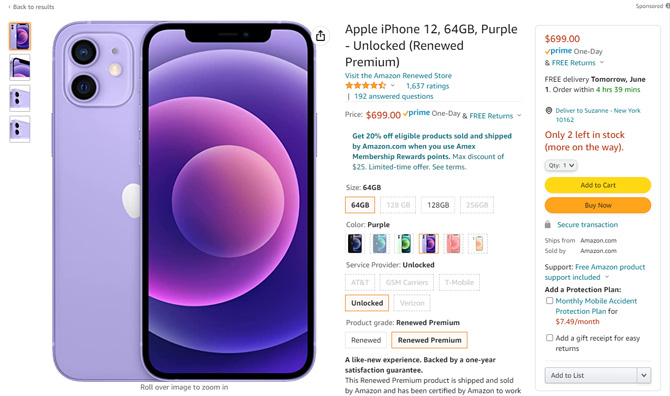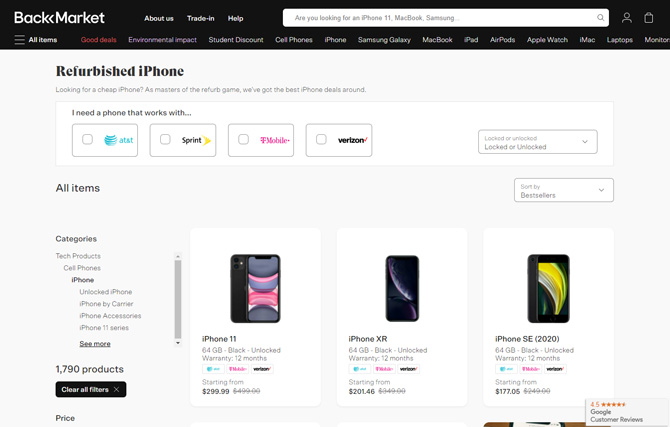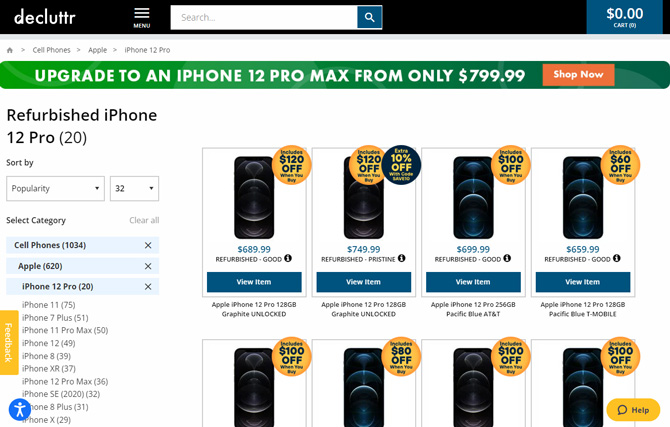If you're interested in saving money on an iPhone, a used phone can save you hundreds of dollars. However, you can't just look at an iPhone and know that it's working properly; you can't see the corrosion inside of a phone with water damage or if a phone's battery will only last for five hours before dying. iPhones still use lithium-ion batteries and battery degradation is a problem after a couple of years. So you need to buy from a seller that's transparent about how the phone has been tested and refurbished, and will back up their products with a return policy and warranty.
You also need to be realistic in your expectations of a discount. If you're looking for an iPhone 13, most discounts are less than $50, as of the writing of this article, which makes buying used not worth it. The best deals are on iPhone 11 and iPhone 12 models. They're new enough that battery life isn't a pressing concern, but old enough to come at a significant discount. You can go for an older model to save more, but unless the battery has been replaced, you should factor in an extra $69 to replace the battery.
What's the difference between refurbished (renewed) and certified pre-owned?
Refurbished and certified pre-owned iPhones have been tested, so you know they are in working order. If the seller doesn't list the iPhone as refurbished or certified it as working, there is no guarantee that it will operate properly. The difference between the two is that certified pre-owned iPhones have been tested and proven to work without needing repairs, while refurbished iPhones have been tested and repaired to work properly.
The gold standard for refurbishing is Apple Certified Refurbished. The phone will be repaired with Apple replacement parts and come with a new battery, a new outer shell, all accessories, and a one-year warranty. While an Apple Certified Refurbished iPhone is usually pricier than other options, it's guaranteed to be as good as new, and you can even buy AppleCare+ phone insurance for additional peace of mind.
If you're not buying Apple Certified Refurbished iPhone, look into out how the seller refurbishes their phones. Reputable sellers will let you know how they refurbish their phones on their websites.
Check the return policy and warranty
You don't want a phone that is being sold "as is" that may have hidden hardware issues. Many retailers have a 30-day return policy. However, if you're buying from a marketplace with individual sellers, the sale is usually final unless the iPhone isn't as described.
You'll find a big difference between buying from a marketplace or a retailer regarding warranties. In general, no warranty comes with iPhones bought from individuals. However, you should expect at least a 30-day warranty with retailers, and you can get up to a year of coverage.
What comes in the box?
When you buy a used iPhone, don't expect all of the accessories to come in the box (or a box at all); most just come with a charging cable. Read the fine print on the product description to know what you're getting before you buy.
Can you use the phone on your carrier?
When you buy a new phone, it's locked to only work on your carrier unless you specifically buy an unlocked phone. A refurbished phone may or may not be locked and it should be clearly noted when you buy.
Where is the best place to buy a used iPhone?
When buying a used iPhone, your safest bet is to head to Apple's Certified Refurbished store. However, you're not going to find a large selection. Right now, Apple is only stocking iPhone 11, 11 Pro, 12 mini, and 12 Pro, and they're marked down between 15 and 25 percent – not much of a discount considering it's the iPhone 11 models that are near 25 percent off.
Carriers also offer used devices, at least in theory. However, when I researched the inventory for this story, there were no used iPhones available from AT&T or T-Mobile, and only a small selection on Verizon. If you can find a used iPhone from your preferred carrier, they do offer pretty good protection plans. Verizon certified pre-owned devices come with a 90-day limited warranty and are eligible for their 30-day return policy and phone insurance. AT&T and T-Mobile have certified pre-owned device programs that offer a 90-day limited warranty and 14-day return window.
Given the lack of selection from Apple and the carriers, you'll likely end up at a third-party retailer. Popular sites like Gazelle, SellCell, and Swappa don't offer a return policy or a warranty (though some individual sellers on Swappa do offer warranties), so I would not recommend going that route. While it would be nice to trust that the seller has repaired the iPhone properly, you need recourse if it doesn't work a few weeks into ownership. You also want to buy from a seller that posts their refurbishing standards, including remaining battery capacity (Best Buy doesn't do this, which is why I don't recommend buying a open box, pre-owned, or refurbished iPhone from Best Buy, either). Reputable sellers also verify that the iPhone has not been stolen.
After researching the options, I recommend three sites for buying a used iPhone: Amazon, Back Market, and Decluttr. All check to make sure the iPhone is stolen, all have return policies, all have warranties, and all post their refurbishing process, including the level of physical imperfections you can expect and battery capacity relative to a new battery.
For current iPhone models, you'll want to head to Back Market and Decluttr. These sites offer three grades of refurbishment, so you can save more by choosing a model with more exterior imperfections. Back Market is a marketplace that connects sellers with buyers and has the largest selection of iPhones (about 1,800 at publication) and best prices. They don't do their own refurbishing, however, they do vet their sellers and hold them to a unified Back Market refurbishing standard. Decluttr falls in between Amazon Back Market, with about 650 iPhones in stock at publication, including current iPhone models, and pricing that's competitive with Back Market. The company does its own refurbishing, so there's a little less worry about refurbishing quality. However, I wouldn't hesitate to buy from any of the three sites.
Amazon Renewed and Renewed Premium

Amazon has a marketplace of refurbished products that includes iPhones. The iPhones are repaired and cleaned to work like new and guaranteed to have no visual imperfections visible from 12 inches – so only minor scratches. However, there isn't a huge selection (a few hundred at publication) and you rarely find current model iPhones.
Amazon has two levels of refurbished iPhones, Renewed and Renewed Premium. Renewed products are refurbished by an Amazon-qualified supplier to work and look like new, have a battery capacity of at least 80 percent, and come with a 90-day Amazon Renewed Guarantee. Renewed Premium products are refurbished by Amazon to a like-new state, have a battery capacity of at least 90 percent, and come with a one-year warranty and technical support.
Return policy: 30 days
Warranty: 90 days for Renewed, 1 year for Renewed Premium
Battery guarantee: at least 80% for Renewed, at least 90% for Renewed Premium
Most recent used models: iPhone 13 models (as of 7/28/2022)
Back Market

Back Market is a marketplace that connects sellers with buyers and has the largest selection of iPhones (about 1,800 at publication) of the sites I recommend. I also found that they had the best prices, on average. Back Market doesn't do their own refurbishing. However, they hold their sellers to a unified Back Market refurbishing standard and guarantee that phones will be 100 percent functional regardless of the condition rating.
Phones in "excellent" condition will have few (if any) tiny scratches, ensuring you get a like-new product. But if you're ok with cosmetic damage, you'll get a better deal on phones in "good" (visible micro-scratches from eight inches away) or "fair" condition (micro-scratches on the screen that aren't visible when turned on, visible scratches and dents to the body). On the product page, you can check to see what accessories with be included (most just come with a charging cable). And you can sort models by carrier (or unlocked), model, color, storage, and physical condition.
Return policy: 30 days
Warranty: 1 year limited warranty
Battery guarantee: at least 85%
Most recent used models: iPhone 13 models (as of 7/28/2022)
Decluttr

Decluttr falls in between Amazon and Back Market on inventory, with about 650 iPhones in stock at publication, and pricing that's competitive with Back Market. The company does its own refurbishing, so there's a little less worry about refurbishing quality. The company has a well-documented testing and certification process to ensure all of its phones work like new.
When you purchase a phone, it comes with a one year limited warranty, and you can return it for 14 days. You can search the inventory by model, color, storage, price, and condition. Pristine condition is like new, Very Good condition shows some light signs of use, and Good has moderate signs of wear and tear. On the listing page, you'll see the accessories that will come in the box (most just come with a charging cable).
Return policy: 14 days
Warranty: 1 year limited warranty
Battery guarantee: at least 80%
Most recent used models: iPhone 13 models (as of 7/28/2022)
Verify your phone is what it was represented to be
No matter where you end up buying your used iPhone, it's a smart idea to verify that you've made (or are making) a sound iPhone purchase before your return window closes.
1. Double check to make sure the iPhone is not stolen
You should never be receiving a stolen device from a major retailer. However, it's a real concern if you purchased the phone from an individual or a small reseller. On the iPhone, go to Settings > General > About and scroll down to find the iPhone's IMEI number. Go to the CTIA's Stolen Phone Checker and enter the IMEI number.
2. Verify the battery health of the iPhone matches what you were told
If the seller claimed 80% remaining battery capacity, you should expect that to be accurate. On the iPhone, go to Settings > Battery > Battery Health. There you will see the maximum battery capacity relative to when the iPhone was new.
3. Run a diagnostics test to ensure there isn't water damage or any other hidden hardware issues
You can make a reservation at the Apple Genius Bar and bring the iPhone in for a free diagnostic test. They will be able to test all of the hardware in a matter of minutes to ensure there are no hidden issues that will cause you big headaches later.
As long as you're a careful shopper, you can save a lot by buying used. So if you're in the market for a new smartphone, consider a like-new refurbished model instead.
[Image credits: iPhone 11 Pro and box and screenshots via Techlicious]
For the past 20+ years, Techlicious founder Suzanne Kantra has been exploring and writing about the world’s most exciting and important science and technology issues. Prior to Techlicious, Suzanne was the Technology Editor for Martha Stewart Living Omnimedia and the Senior Technology Editor for Popular Science. Suzanne has been featured on CNN, CBS, and NBC.














